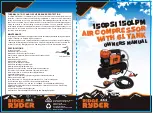
www.scheppach.com /
service@scheppach.com /
+(49)-08223-4002-99 /
+(49)-08223-4002-58
GB | 19
We recommend that you clean the equipment imme-
diately after you use it. Clean the equipment regularly
with a damp cloth and some soft soap.
Do not use cleaningagents or solvents; these may
be aggressive to the plastic parts in the equipment.
Ensure that no water can get into the interior of the
equipment. You must disconnect the hose and any
spraying tools from the compressor before cleaning.
Do not clean the compressor with water, solvents or
the like.
10.2 Maintenance work on the pressure vessel/
condensed water (Fig. 1)
m
IMPORTANT!
To ensure a long service life of the pressure ves-
sel (6), drain off the condensed water by opening
the drain valve (8) each time after using.
Release the vessel pressure first (see 10.5). Open
the drain screw by turning counter-clockwise (looking
at the screw from the bottom of the compressor) so
that all the condensed water can run out of the pres-
sure vessel. Then close the drain screw again (turn
it clockwise). Check the pressure vessel for signs of
rust and damage each time before using. Do not use
the compressor with a damaged or rusty pressure
vessel. If you discover any damage, then please con-
tact the customer service workshop.
10.3 Safety valve (Fig. 2/Pos. 12)
The safety valve (12) has been set for the highest
permitted pressure of the pressure vessel. It is not
permitted to adjust the safety valve or remove the
connection lock (12.2) between the exhaust nut (12.1)
and its cap (12.3).
Actuate the safety valve every 30 operating hours but
at least 3 times a year, to ensure that it works when
required. Turn the perforated exhaust nut (12.1) coun-
terclockwise to open it and use your hands to pull the
valve rod outwards over the perforated exhaust nut
(12.1) to open the safety valve outlet. Now, the valve
audibly releases air. Then, tighten the exhaust nut
clockwise again.
10.4 Storage
m
Important!
Pull out the mains plug and ventilate the equip-
ment and all connected pneumatic tools. Switch
off the compressor and make sure that it is se
-
cured in such a way that it cannot be started up
again by any unauthorized person.
m
Important!
Store the compressor only in a dry location
which is not accessible to unauthorized persons.
Always store upright, never tilted!
Damaged electrical connection cable
The insulation on electrical connection cables is of-
ten damaged.
This may have the following causes:
• Passage points, where connection cables are
passed through windows or doors.
• Kinks where the connection cable has been im-
properly fastened or routed.
• Places where the connection cables have been cut
due to being driven over.
Insulation damage due to being ripped out of the wall
outlet. Cracks due to the insulation ageing. Such dam-
aged electrical connection cables must not be used and
are life-threatening due to the insulation damage. Check
the electrical connection cables for damage regularly.
Make sure that the connection cable does not hang
on the power network during the inspection.
Electrical connection cables must comply with the
applicable VDE and DIN provisions. Only use con-
nection cables with the marking „H05VV-F“. The
printing of the type designation on the connection ca-
ble is mandatory.
AC motor
• The mains voltage must be 230 V~
• Extension cables up to 25 m long must have a
cross-section of 1.5 mm
2
.
Connections and repairs of electrical equipment may
only be carried out by an electrician.
Please provide the following information in the event
of any enquiries:
• Type of current for the motor
• Machine data - type plate
• Machine data - type plate
10. Cleaning, maintenance and storage
n
Important!
Pull out the power plug before doing any cleaning and
maintenance work on the equipment. Risk of injury
from electric shock!
n
Important!
Wait until the equipment has cooled down complete-
ly! Risk of burns!
n
Important!
Always depressurize the equipment before carrying
out any cleaning and maintenance work! Risk of in-
jury!
10.1 Cleaning
Keep the equipment free of dirt and dust as far as
possible. Wipe the equipment with a clean cloth or
blow it down with compressed air at low pressure.






































